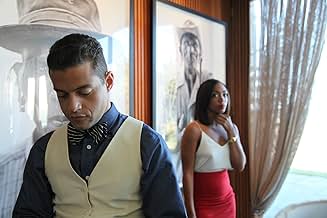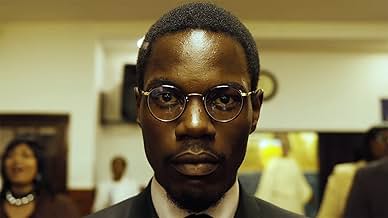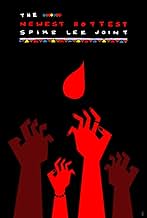IMDb-BEWERTUNG
4,5/10
2029
IHRE BEWERTUNG
Spike Lees stilisierter Thriller DA SWEET BLOOD OF JESUS ist eine neue Art Liebesgeschichte, die den Kern von Liebe, Sucht, Sex und Status in unserer scheinbar hochentwickelten Gesellschaft ... Alles lesenSpike Lees stilisierter Thriller DA SWEET BLOOD OF JESUS ist eine neue Art Liebesgeschichte, die den Kern von Liebe, Sucht, Sex und Status in unserer scheinbar hochentwickelten Gesellschaft in Frage stellt.Spike Lees stilisierter Thriller DA SWEET BLOOD OF JESUS ist eine neue Art Liebesgeschichte, die den Kern von Liebe, Sucht, Sex und Status in unserer scheinbar hochentwickelten Gesellschaft in Frage stellt.
- Regie
- Drehbuch
- Hauptbesetzung
Felicia Pearson
- Lucky Mays
- (as Felicia 'Snoop' Pearson)
Stephen McKinley Henderson
- Deacon Yancy
- (as Stephen Henderson)
Empfohlene Bewertungen
As an old fan of Ganja & Hess, i was very curious to see Spike Lee's take of this arty oddity.
Very few things changed from the script, except the part of minor characters : the slow pace, the theatrical acting and the general mood are scrupulously respected, so you must expect an art-et-essai movie rather than an usual vampire flick.
I didn't found it as bad as the other reviewers, even if I can express a few reserves : the score that sometimes looks like a sort of car play-list (the original was quite experimental), or the lack of twisted shots that made the first movie so unique.
However, I hope that it will encourage the new generation to rediscover the 73 version that still shines like a black diamond, with its strange mix of perversity and religious knick-knack.
Very few things changed from the script, except the part of minor characters : the slow pace, the theatrical acting and the general mood are scrupulously respected, so you must expect an art-et-essai movie rather than an usual vampire flick.
I didn't found it as bad as the other reviewers, even if I can express a few reserves : the score that sometimes looks like a sort of car play-list (the original was quite experimental), or the lack of twisted shots that made the first movie so unique.
However, I hope that it will encourage the new generation to rediscover the 73 version that still shines like a black diamond, with its strange mix of perversity and religious knick-knack.
Spike Lee is one of the premiere directors of my generation. With that said, I am still trying to figure out the focus and purpose of this movie. The actors, many of whom, we've seen in other Lee films, are so subdued and non significant. The movie seems to lack...well, life. His career has created valuable works that have symbolically and literally offered calls for self-awareness and offered insights into the social-political realities of African-Americans and America in general. I can't figure out what significance this movie has. There are some disturbing scenes that do not seem to add any insights or purpose to the movies story. The few things I gathered from this are: rich/poor exploitation, addiction, socio-sexual dynamic, and Sankofa. The story telling doesn't offer anything new or dynamic. So, with a heavy heart, I give this a thumbs down and not let this be representative of Spikes true genius!
I have loved most of the Spike Lee joints I have seen, but this time I felt much disappointed with the remake of "Ganja & Hess". To start with I still do not fathom the cult following of the original: it is true that for its time it was an innovative approach to cinema dealing with paranormal activity, and quite different from most African-American motion pictures of the 1970s, but at the same time I found its central premise a bit pompous and wordy, and many viewers' reactions a bit exaggerated. The so admired "slickness" of both versions is too ornate for me, and quite distracting: it makes the plot look sillier than it is for all its pretension that we are witnessing an "awesome" psychological drama. I have to admit though that Bill Gunn had more control over his own material than Lee: the remake is amazingly disjointed and even longer than the original, with extensive stretches of "music videos" that could have been cut without affecting the drama. As a matter of fact Lee's film contains good elements that do no blend, as Bruce Hornsby's score and varied songs so omnipresent and badly dosed that the soundtrack becomes annoying, no matter how good the composition or the tune are. Then take the beautiful opening credits sequence or the great church scene featuring Valerie Simpson singing and playing the piano, mix them with the obligatory lesbian scene, the dispensable garden cocktail for white scholars, the unexplained trips to town (Hess must certainly be a hot specialist on the Ashanti culture, but we see little of that), the trivial little procession after the wedding... and you get something very bloody but hardly sweet. Your "cultural background" will not suffer much if you skip this.
Dr. Hess Green becomes cursed by a mysterious ancient African artifact and is overwhelmed with a new-found thirst for blood.
Spike Lee has made a very strange film here. Maybe because it was based on another film that happens to be rather strange ("Ganja and Hess") or maybe because it was filmed with a low budget and short on time, with relatively unknown actors... but there is something decidedly off about the picture.
Like the original, there is an ongoing metaphor about addiction. The main character is not a vampire in the traditional sense, despite an unquenchable thirst for blood. He expresses that many (perhaps most) people have addictions... drugs, money, alcohol, women... his is just different.
The Jesus parallel is played up from the original. There is indeed something strange about a man (Jesus) who asks his followers to eat his flesh and drink his blood. Christians, of course, do not find it strange. And that makes the parallel interesting... why do we recoil at one man's thirst for blood and yet look forward to drinking blood each Sunday without thinking anything of it?
Spike Lee has made a very strange film here. Maybe because it was based on another film that happens to be rather strange ("Ganja and Hess") or maybe because it was filmed with a low budget and short on time, with relatively unknown actors... but there is something decidedly off about the picture.
Like the original, there is an ongoing metaphor about addiction. The main character is not a vampire in the traditional sense, despite an unquenchable thirst for blood. He expresses that many (perhaps most) people have addictions... drugs, money, alcohol, women... his is just different.
The Jesus parallel is played up from the original. There is indeed something strange about a man (Jesus) who asks his followers to eat his flesh and drink his blood. Christians, of course, do not find it strange. And that makes the parallel interesting... why do we recoil at one man's thirst for blood and yet look forward to drinking blood each Sunday without thinking anything of it?
Spike Lee's brilliant horror deconstruction.
The director skillfully mixes horror cinematography with some of his antitheses, as in the use of an extremely realistic photography, and constantly lit up scenes.
The drama of Dr. Green's life teaches us that violence is inherent to man, necessary for his survival, but ultimately harmful and capable of killing ourselves. The themes dear to the director, such as the criticism of American society and of racism towards African Americans that is overturned in an wealthy African American character, who is both victim and executioner of his own destiny, remain topical.
Da Sweet Blood of Jesus it is certainly not a masterpiece, but a decidedly enjoyable film and that together with "Only Lovers Left Alive" by Jim Jarmusch offers a new, modern and contemporary vision of the cinematographically harassed figure of "vampire".
The drama of Dr. Green's life teaches us that violence is inherent to man, necessary for his survival, but ultimately harmful and capable of killing ourselves. The themes dear to the director, such as the criticism of American society and of racism towards African Americans that is overturned in an wealthy African American character, who is both victim and executioner of his own destiny, remain topical.
Da Sweet Blood of Jesus it is certainly not a masterpiece, but a decidedly enjoyable film and that together with "Only Lovers Left Alive" by Jim Jarmusch offers a new, modern and contemporary vision of the cinematographically harassed figure of "vampire".
Wusstest du schon
- WissenswertesFilming was completed in 16 days.
- VerbindungenReferenced in Harmontown: Explain Your World View (2017)
Top-Auswahl
Melde dich zum Bewerten an und greife auf die Watchlist für personalisierte Empfehlungen zu.
- How long is Da Sweet Blood of Jesus?Powered by Alexa
Details
- Erscheinungsdatum
- Herkunftsland
- Offizieller Standort
- Sprache
- Auch bekannt als
- The Newest Hottest Spike Lee Joint
- Drehorte
- Produktionsfirma
- Weitere beteiligte Unternehmen bei IMDbPro anzeigen
Box Office
- Budget
- 1.420.000 $ (geschätzt)
Zu dieser Seite beitragen
Bearbeitung vorschlagen oder fehlenden Inhalt hinzufügen

Oberste Lücke
By what name was Da Sweet Blood of Jesus (2014) officially released in India in English?
Antwort



































